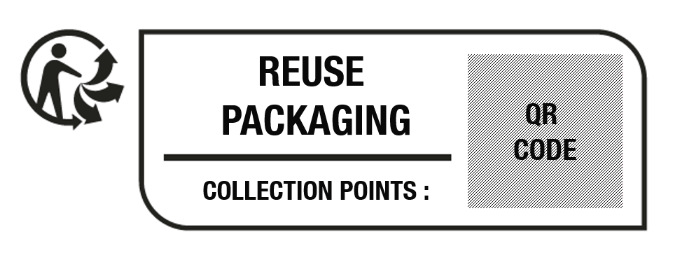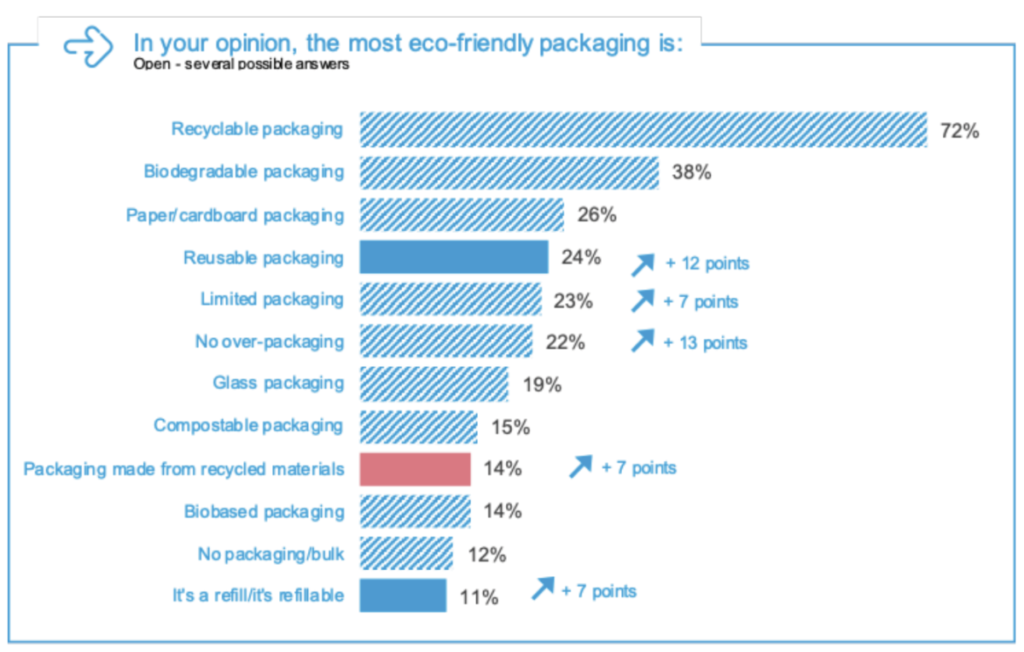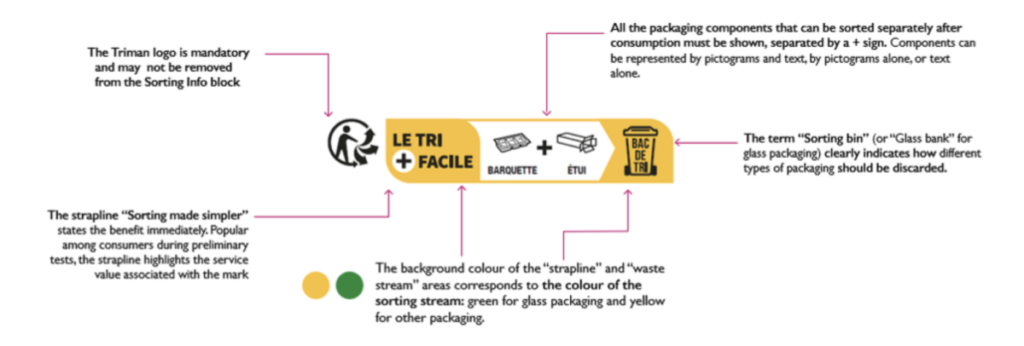
Circular claim: how to better involve consumers into the loop?
Citeo, the French company in charge of the Extended Producer Responsibility for household packaging and graphic papers, strongly welcomes the European Commission’s initiatives foreseen by the Green Deal and the ongoing revisions of the European framework, to further develop a circular economy.
As a matter of fact, the European Union has taken important commitments over the years to empower consumers in the green transition and enable them to be better informed about the environmental sustainability of the packaging and products they buy with the aim to tackle greenwashing practices misleading consumers. Indeed, providing consumers with proven, intelligible, and clear information enable them to make rational choices, adopt more environmentally friendly behaviours and thus develop circular economy at scale.
Clear and harmonised information is essential to include the consumer in the responsible buying action
Improving consumer information ultimately leads to empower consumers to become an active protagonist for switching to a more sustainable consumption. Considering this observation, we are convinced that the European Union should strengthen its legislative framework and should harmonise labels on recycled content, on sorting instructions and on reuse, as part of the proposed revision of the Packaging and Packaging Waste Directive.
Indicating the effective percentages of organic origin and/or recycled content in the packaging will provide consumers with a complete and uniform information on the components of the product. For instance, it would give consumers a better understanding of what bio-based plastics are.
The studies conducted by Citeo conclude that French consumers do not fully understand what bio-based means. According to Citeo’s study on environmental claims conducted in 2019, only 2% of French consumers understand what “bio-based” means. Without the percentage of bio-based material, the term is misleading and can be counter-productive in the fight against plastic pollution.
Equally, a harmonisation of labelling on recycled content will also be useful for consumers to understand whether their packaging is made from recycled materials, and at what percentage level.
Just as consumers need to be able to assess packaging materials to make sustainable choices, they want to appraise their recyclability or reuse potential. As consumption patterns evolve, consumers develop higher expectations on the packaging characteristics, as shown by the recent Shopper study conducted by Citeo and Action Plus. Among those, recyclability and reuse have indeed been rising with specific expectations on bulk in DIY stores or in organic shop.
To meet all these needs and because the consumer purchase decision may be limited in time, Citeo developed this labelling built first on a textual basis “reusable packaging” with further online information about collection points.

Furthermore, while comprehensive product information contributes to enabling consumers to change their habits, efficient collection and recovery of waste are crucial conditions for achieving the European circular economy targets. The introduction of an EU harmonised label on sorting instruction should help to improve collection and achieve the European targets. By way of inspiration, the French “Info-tri” (sorting signage), consumer-tested and built together with producers, provides clear information on the separability of components of the packaging and on sorting points to ensure to facilitate the sorting gesture. In facts, the consumers study shows that 8 consumers out of 10 very well understand this marking.
A transparent communication on products is crucial to support consumers towards new ways of consuming
Packaging is the first touch point consumers have with a product or a brand, but it is often saturated with information which can be confusing and even misleading for them. A recent study led by the European Commission and national consumer authorities and published in 2021 concluded that 42% of online environmental claims analysed were false, exaggerated or deceptive.
Putting selective product information on pack will allow consumers to better understand claims printed on the packaging and their direct consequences in terms of sorting gesture, collection, recycling, carbon, and biodiversity impact, etc.

In addition, to avoid generic claims and enable consumers to choose products that are genuinely better for the environment than their competitors, Citeo recommends using specific and proportionate claims supported by tangible proofs.
The “Product Environmental Footprint” (PEF) developed by the European Commission, within its initiative “Legislative proposal on substantiating green claims” could tackle greenwashing. As it aims to quantify all environmental impacts over the life cycle of a product or service, this initiative would enable companies to support their claims with tangible proofs.
It does address indirect environmental impacts of packaging related to the product, such as the potential effects of packaging on food waste. Therefore, the use of this methodology should be complemented with the use of other existing tools as it is rather a B2B tool for companies to improve their environmental performance than a B2C communication tool.
To empower consumers, the Digital Passport for Products, foreseen by the Eco design for Sustainable Products Regulation (ESPR) is an innovative instrument to make information more transparent. Given that packaging and product are closely linked, information should not be limited to the product itself and should also include sustainable information on the packaging.
Last, and to ensure companies support their claims with tangible proof, the European Commission presented at the end of March 2022 an initiative on empowering the consumer in the green transition, amending Directives 2005/29/EC and 2011/83/EU. Citeo welcomes this initiative which will ensure that companies using generic and non-specific claims, such as “carbon neutral”, are considered to have misleading and unfair commercial practices and can be sanctioned for it. It will provide clear views on the definition of environmental claims.

Innovation is an accelerator to deploy impactful consumer practices
“Consumer empowerment is crucial to accelerate the circularity of our economy. Innovation in terms of use or materials is one of the solutions but it needs to be supported at European level.” – Jean Hornain
To deploy new consumption model, innovation could also be a driver to accelerate the transition to more sustainable actions. The combination of both reuse innovation and material innovation will contribute to increase resource productivity and decouple economic growth from resource consumption and its effects on the environment.
For that reason, each year, Citeo holds the Circular Challenge, an accelerator of solution which aims to help start-ups in the field of circular economy to develop their solution at scale, such as the Chilean start-up Algramo which developed and installed free machines in shops to distribute food and household products in bulk at low prices. Getting consumers to adopt more environmentally responsible behaviour also means giving them the means to act.
Consumers are at the heart of developing new circular models, and an intelligible, clear, and harmonised information at the European Union level will enable them to favour sustainable behaviour in order to further close the loop.




